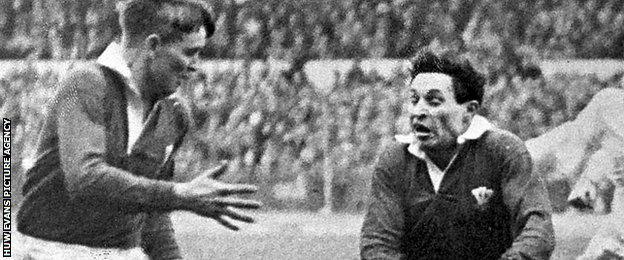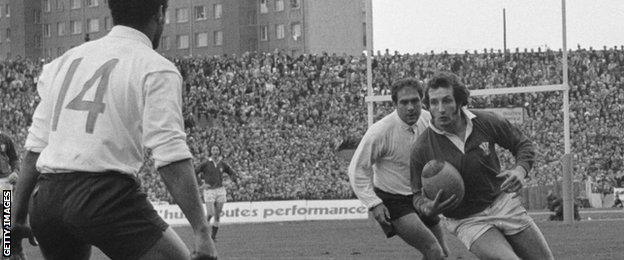Six Nations 2019: Is this the 'greatest Wales side' as Eddie Jones claims?
- Published
- comments
‘Greatest ever Welsh team? I’m biased!’
Eddie Jones is renowned for his sense of mischief, so you could be forgiven for taking a pinch of salt with his comment that his England team will face the "greatest Wales side ever" in their Six Nations showdown on 23 February.
England have started the competition in imperious fashion with back-to-back bonus-point victories over Ireland and France, while Wales have struggled for form despite also winning both their matches in France and Italy.
But despite the underwhelming nature of their performances, Wales' triumph in Rome on Saturday was their 11th in succession - equalling the longest winning run in their history.
The last time Wales achieved such a sequence was 1910, and victory over England would see Warren Gatland's side claim the record for themselves.
But just how good is this Wales side? And where do they rank compared to the other outstanding Wales teams? Here are some other key contenders for the title of Wales' best ever...
The standard bearers (1907-11)
Winning 11 matches in succession was particularly impressive for the Wales side who achieved it between 1907 and 1910, considering how infrequent fixtures were at the time compared to the congested calendars of the present day.
Starting with a crushing 29-0 win over Ireland in March 1907, the long unbeaten run included back-to-back Grand Slams in 1908 and 1909.
And although they were finally beaten by England at Twickenham in January 1910, Wales recovered to claim another Grand Slam in 1911, leading many to label this period the 'first golden era of Welsh rugby'.
Beating the All Blacks (1950-53)

Cliff Morgan (right) was one of the British and Irish Lions who helped Wales beat New Zealand in 1953
Results suggest Wales against New Zealand is one of the most one-sided contests in sport, but there was a time when it was a fiercely competitive rivalry.
The most recent Wales victory came back in 1953, with the home side captained at a packed Arms Park by Bleddyn Williams, who had beaten the All Blacks with Cardiff just four days earlier.
A 13-8 victory over New Zealand was the crowning glory for a team - including the likes of fly-half Cliff Morgan - that also won Five Nations Grand Slams in 1950 and 1952.
The 'second golden era' starts (1971)
Wales had won or shared four Five Nations Championships between 1965 and 1970, but their iconic 1971 Grand Slam elevated Welsh rugby to new heights.
The clinching victory in Paris is etched into folklore, with Gareth Edwards scoring Wales' opening try to finish the campaign as the competition's top try scorer with four.
Scrum-half Edwards was part of a magical team that featured other global greats such as Barry John, Delme Thomas, Mervyn Davies, JPR Williams and Gerald Davies - all of whom helped the British and Irish Lions to a famous series win in New Zealand later that year.

Gareth Edwards (right) takes on the French defence in Paris in 1971
A glorious end to the domination (1976-78)
Wales utterly dominated the Five Nations during the 1970s, winning five Championships outright - including three Grand Slams - and sharing a further two titles.
They ended the decade in sparkling fashion, with the likes of Edwards and fly-half Phil Bennett orchestrating some of the most mesmerising rugby union played in the sport's history.
Bennett brought the curtain down on his career in typically brilliant style, scoring two tries as he captained Wales to a Grand Slam-sealing win over France in 1978.
Although Wales won the Five Nations Championship and Triple Crown the following year, it would be 27 years until they would win their next Grand Slam.
Gatland's peak years (2011-13)
Welsh crowned Grand Slam champions
When Warren Gatland was appointed in 2007, Wales were at one of their lowest ebbs after being knocked out of that year's World Cup by Fiji at the pool stage.
The New Zealander led Wales to a Grand Slam in his first Six Nations campaign in 2008 and they arguably enjoyed the most successful period of his reign between 2011 and 2013.
After reaching the World Cup semi-finals in 2011 - where they lost in agonising fashion to France - Wales won a Grand Slam in 2012 and defended their Six Nations title the following year with a spectacular 30-3 dismantling of England in Cardiff, a triumph overseen by Rob Howley with Gatland away on a British and Irish Lions sabbatical.
Highlights: Wales secure record-equalling 11th straight win